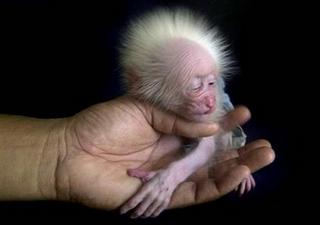People & Animals
 I just got this subscription to the supposedly most e-mailed photos. I've been surprised how many are of animals. I have to say that today's photo of a 7-day old baby macaque is cute. (Go here for photo with full caption from yahoo).
I just got this subscription to the supposedly most e-mailed photos. I've been surprised how many are of animals. I have to say that today's photo of a 7-day old baby macaque is cute. (Go here for photo with full caption from yahoo).To me, what's more interesting than animals is the human obsession with animals, which I think reflects an inherent moral quandary over how we treat other life forms, and ultimately matter. Though I'm a vegetarian, I don't consider myself an animal rights advocate, and I don't intend to suggest I wish to influence the the behavior of the listener on this point. I'm simply noting the obvious subjectivity over where one draws the line.
Naturally, human morals is contingent on the notion that our consciousness is entitled to far greater consumption of resources than any other form of consciousness. It's a survival mechanism: Each organism, including the human, will naturally consume as much as possible, before allowing any other organism, except those with a similar genetic makeup, to consume any.
In order for the human mind to make this logically sensible, which is necessary for survival, it must judge the consciousness of the other in relationship to the other's apparent similarity, or lack thereof, to the mind of the judge. That such a notion of morals would evolve make sense, because our genes motivate our bodies to promote the success of bodies that house similar genes (see Dawkins). Thus, a person is normally motivated greatly to help a relative, to a much lesser extent, the baby macaque, and only nominally, bacteria.
The reductionist school of ethics analyzes all behavior as ultimately caused by prior events, that themselves were caused. That is, free will is purportedly denied. I'm naturally critical of this thesis, because it seems to deny the possibility of morals. Yet we have good reason for wanting morals to exist. If they do, it bodes well for our long-term future ...

0 Comments:
Post a Comment
<< Home